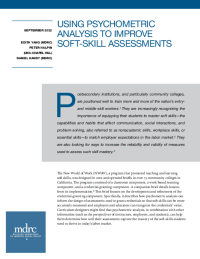Using Psychometric Analysis to Improve Soft-Skill Assessments

 Postsecondary institutions, and particularly community colleges, are positioned well to train more and more of the nation’s entry- and middle-skill workers. They are increasingly recognizing the importance of equipping their students to master soft skills—the capabilities and habits that affect communication, social interactions, and problem-solving, also referred to as nonacademic skills, workplace skills, or essential skills—to match employer expectations in the labor market. They are also looking for ways to increase the reliability and validity of measures used to assess such skill mastery.
Postsecondary institutions, and particularly community colleges, are positioned well to train more and more of the nation’s entry- and middle-skill workers. They are increasingly recognizing the importance of equipping their students to master soft skills—the capabilities and habits that affect communication, social interactions, and problem-solving, also referred to as nonacademic skills, workplace skills, or essential skills—to match employer expectations in the labor market. They are also looking for ways to increase the reliability and validity of measures used to assess such skill mastery.
The New World of Work (NWoW), a program that promoted teaching and learning soft skills, was designed in 2012 and operated briefly in over 75 community colleges in California. The program consisted of a classroom component, a work-based learning component, and a credential-granting component. A companion brief details lessons from its implementation. This brief focuses on the development and refinement of the credential-granting component. Specifically, it describes how psychometric analysis can inform the design of assessments used to grant credentials so that soft skills can be more accurately measured and employers and educators can recognize the credentials’ value. Curriculum designers might find that psychometric analysis, in combination with other information (such as the perspectives of instructors, employers, and students), can help them determine how well their assessments capture the mastery of the soft skills students need to thrive in today’s labor market.






